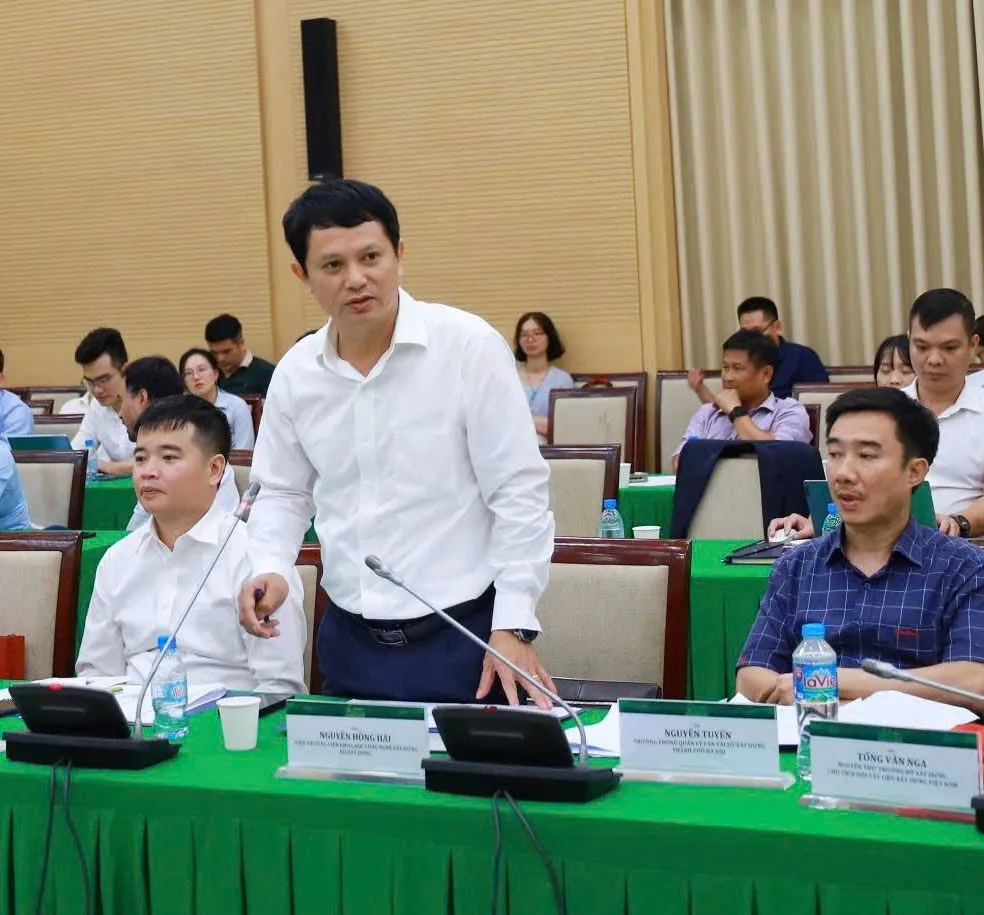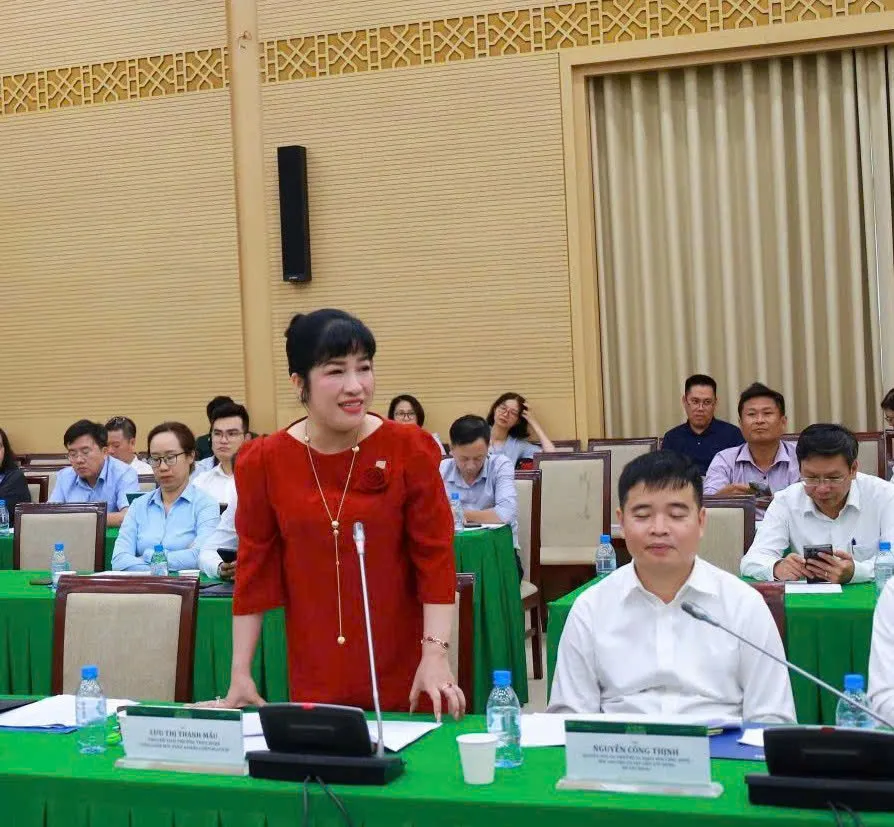Vietnam prioritizes green constructions for sustainability
Green constructions are key to turn Vietnam into a sustainable, modern and energy-efficient country.
Promoting green buildings and smart urban infrastructure is a strategic task to transform Vietnam into a green and modern country, contributing to its net zero goal by 2050, said Deputy Minister of Construction Nguyen Van Sinh.
Addressing the forum titled “Solutions to promote green buildings and green transportation towards sustainable development goals”, co-organized by the Hanoi People's Committee and the Ministry of Construction (MOC) on October 16, Sinh highlighted that Vietnam has enacted some significant policies to promote green buildings and sustainable development.
He reaffirmed Vietnam’s commitment to developing into a green and sustainable the country, calling for participation and cooperation from experts, investors, consulting organizations and individuals with experience and expertise in green development.
“Developing green buildings will contribute to reducing energy, water, material consumption and CO₂ emissions; promoting the production and use of green materials and recycled materials; improving the efficiency of urban land use and the quality of the environment,” said Sinh.
He quoted Resolution No.06-NQ/TW on sustainable urban management in Vietnam as saying that the implementation of urban infrastructure development investment programs until 2030 should encourage the use of green materials, buildings and energy in urban areas.
Under the resolution, Vietnam targets to develop green transportation, expand green spaces and ensure that construction projects adhere to energy-saving and greenhouse gas reduction standards.
The resolution is deployed through the Law on Environmental Protection, the Law on Economical and Efficient Use of Energy, the Law on Construction, among others. “Content on green building development has been mentioned in a number of provisions of these laws,” Sinh noted.
Based on legal regulations, the Ministry of Construction has promoted green buildings over the past years and has achieved many positive results.
Green buildings have emerged in Vietnam over the past 15 years. From the first ones in Ho Chi Minh City, there are now over 600 towers of across the country, with a total floor area of nearly 17 million square meters.
Considering the annual construction of residential and office buildings totals around 100 million square meters, excluding industrial factories and other structures, the potential for green building development in Vietnam remains substantial, stated the official.
Vu Linh, a technician of the MOC, told The Hanoi Times that green buildings enhance energy efficiency, reduce carbon emissions, promote sustainable use of natural resources and minimize environmental pollution.
"Green buildings use better ventilation to improve air quality and can reduce noise pollution through sound-absorbing materials and insulation. Studies show that green buildings can significantly boost worker productivity, which translates to major cost savings for organizations," said Linh.
He emphasized benefits like better indoor air quality, reduced noise and energy savings, while also highlighting the need for new technologies, sustainable materials, and supportive government regulations.
Thus, fostering green building development is a key solution for accelerating green transition at the national level, Linh affirmed.
Challenges and solutions for green buildings
Despite strong policies from the Vietnamese government and momentum from international commitments, green building development in Vietnam has faced several challenges, according to Deputy Minister Nguyen Van Sinh.
“These include the fact that green building development is currently encouraged but not mandatory, and investors face technical, technological, and financial limitations, as well as difficulty in accessing green financing,” said the official.

Nguyen Hong Hai, Director of the Institute of Construction Science and Technology under the Ministry of Construction.
According to Nguyen Hong Hai, Director of the Institute of Construction Science and Technology under the Ministry of Construction, initial investment costs for green conversion is much higher than for that for conventional investment.
“This is a major barrier that makes many businesses hesitate to develop green projects.”He pointed out one more barrier is that investors have not been aware of the benefits of green buildings, so many businesses do not want to invest, especially when they see big initial costs.
“The mechanisms and policies related to green buildings are just an encouragement. Therefore, Vietnam needs to issue mandatory regulations, with a suitable implementation roadmap to strongly promote green building development in localities in the time ahead,” Hai told The Hanoi Times.
Nguyen Quoc Hiep, President of the Vietnam Association of Construction Contractors, proposed to improve mechanisms and policies to open up the market and attract social resources to green buildings, promote the use of environmentally friendly materials and accelerate the application of energy-saving technology.
“In particular, state management agencies need to focus on researching and communicating a set of criteria and standards for green buildings, so that businesses can apply them easily and uniformly across the country,” said Hiep.
He suggested that the Institute of Construction Economics should further research the investment efficiency of green buildings, especially their usage efficiency and payback period compared to conventional buildings, to make the benefits clearer to potential users.

Luu Thi Thanh Mau, General Director of Phuc Khang Investment & Construction Group.
Luu Thi Thanh Mau, General Director of Phuc Khang Investment & Construction Group, recommended that Vietnam should focus on making criteria and standards for green buildings as soon as possible.
“I hope that the MOC will work to provide complete information and databases, simplify administrative procedures and improve create a favorable legal framework for green building development,” Mau shared with The Hanoi Times.
She suggested the ministry to issue circulars guiding specialized agencies in addressing challenges, developed standards for energy saving, and issue new standards to raise investor awareness of their responsibilities in building, managing and operating projects that meet energy-efficient and green building standards
Concluding the forum, Deputy Minister Nguyen Van Sinh affirmed that the MOC will continue to closely coordinate with ministries, localities, business community and international organizations to perfect policies and create a favorable legal corridor for the development of green buildings.
The forum is a key component of the broader the Vietnam Green Building Week 2025, which will be held in Hanoi on October 29 under the theme “Innovation in sustainable construction: Promoting green building and green transport development.”
The week will feature discussions, an exhibition of green technologies and an awards ceremony. The week's activities focus on innovation in eco-friendly materials, energy efficiency and smart urban planning, aiming to accelerate Vietnam's progress toward its sustainability goals.
The exhibition will showcase eco-friendly materials, smart equipment and green finance products. The awards ceremony will honor contributors to green growth and present the Student Green Architecture Awards and green building certifications.








